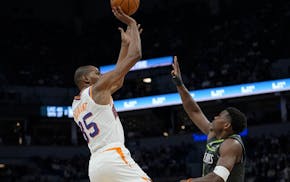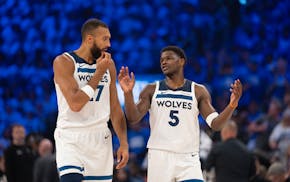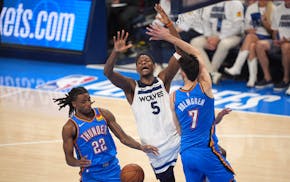When they aren't spinning stories, what the veterans of the Twins' 1987 and '91 championship teams will tell you is that they had luck on their side.
They stayed healthy. They caught breaks. They were good enough and smart enough to take advantage of opponents' mistakes.
The 2016 Minnesota Vikings experienced almost no luck.
Remember, on the morning of Oct. 23, they had forgotten what it was like to lose an NFL game. They were 5-0. They had won eight straight regular-season games. They were coming off a bye week in which Mike Zimmer earned comparisons to Bill Belichick and the Vikings defense to the '85 Bears.
As the Vikings drive carefully through St. Peter's speed traps for their final training camp in Mankato, the most pertinent question facing them is whether what they had accomplished to that point was fluke or template.
As of Oct. 23, they had beaten three teams that would make the NFL playoffs, and another that had won the conference championship the year before. They had won twice on the road and had opened U.S. Bank Stadium with a thrilling victory over They Who Shall Not Be Named.
Only a missed 27-yard field goal had kept them from advancing in the playoffs the previous season. They had the look of a budding power.
Then they collapsed, losing eight of their last 11 games, playing like invertebrates in a home loss to the Colts in December and eliciting predictable responses from fans who believe that early-season success is more tease than prelude.
So are the 2017 Vikings charged with banishing all memories of 2016, or with reviving the feeling the team had in mid-October? Was 5-0 a mirage?
For all of the latent pessimism surrounding the franchise, the makeup of the current roster and the nature of the NFL indicates that the 2016 team simply was destroyed by injuries. Even without a healthy offensive line, star running back and starting quarterback, the Vikings were in position to make the playoffs. Two excruciating losses to Detroit made the difference between 10-6 and 8-8.
The Vikings built a quality roster that was waylaid by an offensive line that couldn't create a running game or give Sam Bradford enough time to look downfield.
The defense, tasked with carrying the team, wore down over the final 11 weeks. A competent offense would have prevented that from happening.
As dangerous as optimism tends to be in Vikingdom, here are the places the Vikings should be improved:
1. Offensive line. Riley Reiff and Mike Remmers are hardly stars, but the Vikings need only competence to improve dramatically here. In part because excellent pass-blockers are so difficult to acquire, the Vikings strengthened their run blocking, which should lead to improvement at …
2. Running back. Adrian Peterson was ineffective even before he was injured. Jerick McKinnon is a role player. Matt Asiata was limited.
Dalvin Cook could become a star. Latavius Murray would have been good enough to be the Vikings' every-down back last year and will need only to be a role player this year. A stronger running game should mean more time and options at …
3. Quarterback. Having your franchise quarterback suffer a catastrophic knee injury before the season begins ranks as the worst of possibilities for an NFL team. Shaun Hill was not a quality backup.
This year's team will rely on Sam Bradford after he's had a full offseason as a starter while paired with familiar mentor Pat Shurmur. Bradford performed admirably with poor blocking, little time and no running game last year. He should be even more productive this year while targeting a competent group at …
4. Wide receiver. A full season of Adam Thielen as a starter and the expected development of Laquon Treadwell as a regular option should make this group dangerous.
Zimmer's first team went 7-9, and his second finished 11-5. With decent luck and health, there is little reason to doubt that this team should win 10 or 11 games and return to the playoffs.
Jim Souhan's podcast can be heard at MNSPN.com. On Twitter: @SouhanStrib. jsouhan@startribune.com

Souhan: Anxiety and depression in the NFL helped inspire Lindsey Young's children's book
Souhan: For Lynx star Napheesa Collier, 'Phee' is just fine

Souhan: Will the Wolves trade for Kevin Durant? Should they?

Souhan: If Edwards is a franchise player, he needs to act and play like it

